- Home
- Bruce, Leo
Death of a Bovver Boy Page 5
Death of a Bovver Boy Read online
Page 5
‘By George,’ he said, with professional interest. ‘Is that your car?’
‘Yes. Bit of a screamer, isn’t it?’
‘I like strong colours on cars, though mine’s black.’
‘Skilly’s the same. He says he approves of mine but has a quiet little green Cortina for himself.’
Carolus said goodbye, and as an afterthought asked Leng if he might come again if there was anything else he wanted to know.
‘Of course,’ Leng said. ‘Come in any time.’
Now it was time for Dutch Carver’s mother and Carolus reminded himself to say ‘Mrs Delafont’ when he addressed her.
She had seemingly dressed for the occasion for surely a busy housewife would not be likely to be wearing what could only be described as a tea-gown, if such a thing was possible in the 1970’s. She welcomed Carolus and explained rather archly that she could guess what he had come about.
‘You want to tell me about the Investment Trust I wrote in about.’
‘No,’ said Carolus, but at first it did not seem that Estelle Delafont, as Flo Carver had become, had heard him. She was examining herself with a broad smile of approval in the mirror over the mantelpiece.
‘I was sorry I was out when you came this morning. I was having my hair done. Do you like it?’
‘No,’ said Carolus determined to attract her full attention, and before she could speak added—‘I’ve come to see you about your son Kenneth, the one who has been murdered.’
He pronounced the last word with such emphasis that Estelle looked positively alarmed.
‘I did see something in the paper about it,’ she answered coolly.
‘You know you had a son, presumably?’ went on Carolus. ‘And that on Sunday night he was found dead in a ditch beside the road, stark naked?’
‘I don’t know anything about that,’ said Estelle.
‘You know now, because I’ve just told you. I gather Kenneth was not your favourite son. But surely news like this must be painful to you?’
‘I suppose it is. Of course I hadn’t seen much of him lately. Are they sure it was murder?’
‘Quite sure. He had been suffocated.’
‘Dreadful, isn’t it? Would you care for a cup of tea?’
‘No thanks. When did you see him last?’
‘Who? Kenneth? Oh not for a long time. My husband didn’t encourage him to come here.’
‘Your…?’
‘Mr Delafont. He had no use for Kenneth. He knew how he’d made me suffer.’
‘How?’
‘He was always a thoughtless boy. Not like his brother Roger. Even his father admits that. I was so ashamed when he—Kenneth I mean—got into all that trouble.’
‘What trouble?’
‘He was never out of it. The police and everything. People looked at me as though it was my fault, as though I hadn’t brought him up properly. I’m sure I did everything I could for him. Mr Delafont says I did far too much.’
‘And did you?’
‘At first I did. But when I saw that he had no gratitude at all I gave it up. If you can’t show a little appreciation, I said, you can get someone else to do things for you because I’m not going to. Mr Delafont said I was quite right. I don’t like the way he’s made it all curl up above the ears, do you?’
Carolus, who had long practise in this kind of dialogue, was able to realize that it had switched to this morning’s session at the Maison Chic but hung on like a bull-dog to the subject of Kenneth.
‘How long is it, would you say, since you had helped your younger son?’
‘Helped him? He doesn’t need help! He’s always got plenty of money, and buys himself more new clothes than I can afford to. Sometimes I think I look almost shabby. Don’t you think so?’
‘I don’t know anything about it. Did you see Kenneth on the Saturday afternoon before his body was found?’
‘Well, I don’t know about seeing him. The lady next door who spoke to you this morning did mention that he’d been round early in the afternoon.’
‘How early?’
‘Before three, she said. I had the telly on and didn’t know anything about it. She said he didn’t hardly touch the bell of the front door but that he went away again. I didn’t hear it and it’s a good thing I didn’t because I’d have told him to clear off, pretty quick. I’ve got too much to look after without bothering about him.’
‘Did anyone bother about Kenneth, Mrs Delafont?’
‘Well, it was his own fault. He never paid any attention to me so I seemed to lose interest in him. Do you like these shoes? I bought them this morning at the Co-Op. It’s the style nowadays. Only it changes so quickly you never know where you are.’
Carolus was silent and Kenneth’s mother said—‘Well, I must Get On. I’ve got a lot to do before Mr Delafont comes home. I hope you’re successful,’ she added insincerely. ‘It’s a nasty thing to have come on suddenly like that. Do you happen to know what they’ll do about the funeral? I should think the police would look after that, wouldn’t you? They’ve done it all so far. I mean they wouldn’t expect his father and me to be responsible, would they? Not after what’s happened. There’s one thing, though. Whatever do you think happened to his clothes? It seems funny his having been found with nothing on. Do you think someone did it so they wouldn’t recognize him? Or was it out of spite? You read of that, don’t you, only it’s usually a woman they do it to. It must have given someone a start, finding him like that. Only you can’t tell nowadays. You never know what you’re going to see in the papers next. Well, ta ta, then. I hope you get to the truth of all this. It quite upsets me when I think of it. Only Mr Delafont says I mustn’t worry. Things like this are always happening.’
She waved gaily from the door and Carolus escaped.
Chapter Six
‘The Dragon’, Leng had named as the pub used by the skinheads, and Carolus made for it. He left his car in a more or less concealed park and entered the barroom.
It was empty but for two youths unmistakably of the kind he expected to find. One was a tall hefty young man with a rather brutish expression on his face, the other a skinnier individual with small cunning eyes.
Carolus went straight up to them. He expected trouble and did not mean to leave them the initiative. He was fit, remarkably fit for his age, but knew something of the modern idea of fair odds in a fight.
‘Either of you named Bodmin?’ he asked.
They did not turn towards him or make any direct answer but the bigger youth turned to his shifty friend and asked in a tired voice, ‘Who’s this mug?’
The friend obliged. ‘Some mug,’ he answered, not very inventively.
The larger oaf continued still addressing his friend—‘Looks like the Law to me. They get them in all sizes nowadays.’
The friend grinned. ‘But not this sort, surely.’
Carolus did not show any anger.
‘I asked you a question,’ he said to the taller one.
‘And I didn’t answer. So push off, will you? We’re talking.’
Carolus without any haste or excitement, picked up the youth’s newly filled pint of beer and emptied it over his head. There was a splutter, a lunge and in a second the youth was on the floor.
The friend made no attempt to go to his assistance. He seemed baffled.
‘How did you do that?’ he asked Carolus. ‘Karate?’
‘Nothing so oriental,’ Carolus replied. ‘Just old-fashioned Unarmed Combat which we learned in the last war.’ The big boy had struck his head on something and looked up dazed.
Carolus extended a hand.
‘Ups-a-daisy,’ he said good-humouredly. ‘And the next question I ask will be answered. Is your name Gil Bodmin?’
‘What about it?’
‘Where were you on the Saturday night when Dutch Carver was murdered?’
‘Nowhere in particular. Why? I had nothing to do with it!’
‘You are deplorably bad at answering questions. I a
sked you where you were that night?’
‘You were at the Cattle Market, weren’t you Gil? That’s a discotheque,’ suggested the skinny one.
‘That’s right,’ agreed Gil.
‘Did you see anything of Dutch Carver?’
‘No. I didn’t. I never saw him that day, or the day before.’
‘Or the day after?’
‘Course not. He was dead, wasn’t he?’
‘You tell me.’
‘Everyone says so, anyway. He was supposed to have been done on the Saturday night. And found over near Newminster on Sunday.’
‘How do you think he got there?’
‘I don’t know! How am I to know? I never saw him. What do you want to ask me for?’
‘He doesn’t know anything about it,’ put in the friend.
‘Had you got anything against Dutch Carver?’
‘No. Only that he was a greaser. Not one of our crowd. I didn’t do him, if that’s what you mean.’
‘Then I wonder why so many people in Hartington seem to think you did.’
‘I can’t help what they think. I never touched him.’
‘You have a motor-cycle?’
‘Yes. So have all the other lads.’
‘Was Dutch ever on your pillion?’
‘No!’ Gil shouted. ‘Never! I wouldn’t take a greaser like that on my pillion. Or have anything to do with him.’
‘Or cut his hair?’
‘Who cut his hair? I didn’t. I didn’t know anything about that. If someone cut his hair off it wasn’t me.’
‘But it might have been, Gil? I mean you or some of your friends have been known to cut off long hair from what you call the greasers, haven’t you?’
‘Not me. Some of them have. Well, they’re such——ing cissies with hair half down their back. Some of the lads don’t like to see it.’ He turned on his friend. ‘Tell him about the cushion,’ he said.
‘It’s only that they’re stuffing a cushion with the greasers’ hair. Like Indians with scalps. Not Gil, mind you. Some of the other lads.’
Carolus had to be content with that information, at least for the moment.
‘Now you answer me some questions,’ suggested Gil, whose courage seemed to be regained. ‘Are you the Law?’
‘No. Just a private individual, but interested,’ said Carolus. ‘Why doesn’t your aunt want you to have anything to do with her little daughter?’
‘Who says she doesn’t? She’s never taken any interest in young Liz herself. Leaves her to run about the streets all day. Then she tells you I have to keep away from her.’
‘Why?’ persisted Carolus.
‘I don’t know why. Because she’s an old bitch, I suppose. She’d sooner let that greaser take her about than what she would me. What the kid needs is her mother to look after her.’
‘Your aunt seems to work very hard.’
‘No more than anyone else. And she doesn’t need to. She’s got a pension from my Uncle Jack.’
‘We’re getting away from the subject. You say you had nothing to do with Dutch’s death. Who do you suggest might have, then?’
‘Almost anybody. No one liked him. Even his brother had no use for him. And the rest of his greaser friends—Grayne and White and all that lot. You should have heard them talk about him. They’re supposed to have said they meant to do for him one day…’
‘To whom did they say that?’
‘I don’t know. That’s what I heard, anyway. I wouldn’t put it past his own father for that matter. Or that bitch he’s living with.’
‘What about his mother?’
Gil grinned.
‘Have you seen her?’ he asked. ‘But I never liked that Pakistani fellow…’
‘Not Pakistani, surely? I understand that Delafont is a West Indian.’
‘So he may be, but I don’t like the look of him. There’s one, if you’re looking for who did Dutch. Could easily have been him. And I’ll tell you who else may have had something to do with it. That’s the fellow who owns the discotheque where the greasers go. Swindleton he’s called. Just the type. Mind you, I don’t say it was him, but I wouldn’t be a bit surprised. Dutch was always round there. Wasn’t he, Trimmer?’
‘Trimmer’ was evidently the skinny friend.
‘Certainly was,’ he replied. ‘Never came anywhere where we went.’
‘What about girls?’
Gil grinned again.
‘What about them?’
‘You talk as though yours was an all-male community, and Dutch’s crowd, too.’
‘Oh yes. There were girls all right. Only ours didn’t seem to mix much with theirs. There was some seemed to go for the greasers, like that Lotta.’
‘Lotta?’
‘Yeh. Carlotta her name is. A big busty girl. Always round with Jenny Rivers. They might be able to tell you something about Dutch. They went to the Spook Club, too. Lotta works in the same place as my sister. King’s Supermarket. She’s nearly always on the vegetables if you go round there. Big girl, she is. Always got a grin on her face. My sister’s a cashier. Gets more money and shorter hours.’
Carolus for the first time became aware of the man behind the bar. He wore a fancifully trimmed beard and seemed to be listening intently to the conversation without wishing to interrupt it.
‘Have a drink?’ Carolus asked the two young men, thinking that they had been quite long enough on the premises without showing themselves as customers. They both accepted bitter, and Carolus asked for pints and a Scotch for himself. They were all served and Gil turned to Carolus in almost a friendly way.
‘Cheers,’ he said. ‘Tell you what. Are you going to show me that trick of yours? How you put me down, I mean? Quickest thing I ever saw. And you say it’s not Karate?’
‘It’s easy,’ said Carolus and repeated his original performance but less violently.
Gil took it well and got to his feet.
‘Try it on him,’ he said indicating Trimmer. ‘I want to watch.’
Trimmer was a willing victim.
‘Unarmed Combat, you say,’ put in the landlord. ‘Looks to me more like Jiu-Jitsu.’
He was interrupted by the entrance of a group of shaven-headed louts who gave surly greetings to Gil and Trimmer.
Carolus saw that an extraordinary change had come over Gil. All his good humour disappeared and his face took on the bestial expression it had worn when Carolus arrived. It was evident that he had what in other circles might have been called ‘a position to keep up’. It would never do for him to be seen by his friends or followers or whatever the new arrivals were, in polite conversation with Carolus.
Carolus could understand that. He knew enough about these street gangs to know that leadership could only be maintained by a show of vicious, often criminal, strength. But it was a revelation of the young man’s character.
‘Ought to have seen Gil just now,’ said Trimmer who was evidently less aware than Carolus was of the subtlety of the situation.
‘Why?’ said a dark-haired boy who, Carolus learned afterwards, was named Nat Fisher.
This seemed to release a spring in Gil.
‘Shut up!’ he shouted to Trimmer, moving towards him.
‘Ought to have seen him!’ continued Trimmer derisively. He got no further. With startling speed Gil had produced a knife and was holding it under Trimmer’s chin.
‘I told you to shut up,’ he said furiously.
Trimmer was—quite literally and obviously—afraid for his life.
‘I was only saying,’ he muttered.
‘Next time I tell you to shut up,’ Gil said, ‘you shut up. And quick. Now get going and don’t let me see you again.’
Trimmer turned by the door.
‘I wasn’t going to say anything,’ he said.
Gil did not seem to find this worth answering but Trimmer’s departure was delayed by the landlord.
‘You owe me for that first round.’
Thus brought back into the room T
rimmer became almost effusive.
‘So I do. Must have forgotten. How much was it?’
The landlord told him and Trimmer brought out a pound note.
‘Out!’ said Gil when the landlord had given him his change.
Gil’s prestige was restored and Carolus was left alone with four of the town’s skinheads and observed their movements.
‘Who’s this——?’ demanded Nat Fisher after a seemingly contemptuous glance at Carolus.
‘Some bloke,’ said Gil. The fact that he used a less offensive term than Nat seemed to indicate to the others that Gil did not find Carolus’s presence unwelcome.
‘D’you know him?’ Nat asked the landlord.
‘Never seen him before,’ said the bearded man behind the bar. ‘He’s pretty good at…’
‘D’you want what Trimmer’s got coming to him?’ Gil asked, leaning threateningly across the bar.
The landlord was not as scared as Trimmer had been, but he was scared. A noteworthy force seemed to be represented by Gil Bodmin.
‘I was only going to say he was pretty good at darts,’ said the landlord with considerable presence of mind.
Carolus had been amused that all this talk referring to him had been carried on as though he was not present, or perhaps in existence. None of the youths seemed to be of quite normal intelligence though Gil was the least primitive of them all. He could well see how they had become the chief suspects in the case of Dutch Carver’s death though he had seen nothing positively murderous about any of them, except perhaps Gil’s schizophrenic determination to dominate the situation at all costs. That, Carolus realized, could indeed be dangerous. Suppose that Dutch Carver had called down upon himself some of that brutal violence, that consuming vanity of a youth who precariously held on to his authority over the others, would it not have meant just what Dutch had suffered, gross humiliation and death? It was no use turning back to the time of awkward young ruffians, mischievous boys, the unruly sons of weak parents—these boys were potential killers. Not one of them, not even the shifty Trimmer, could be erased from a list of suspects in the case.
On the other hand there were people as likely to have been involved as these, and Carolus remembered the two abominable parents on whom he was inclined to lay the blame for what Dutch had become. And he had yet to meet the sinister Swindleton and the two girls whom Gil had connected with Dutch.

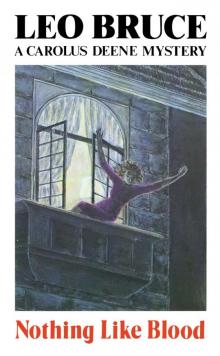 Nothing Like Blood
Nothing Like Blood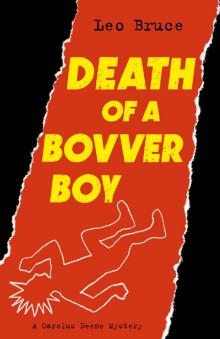 Death of a Bovver Boy
Death of a Bovver Boy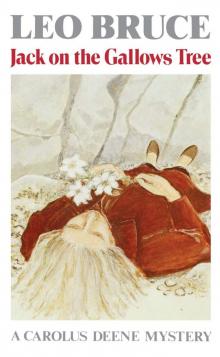 Jack on the Gallows Tree
Jack on the Gallows Tree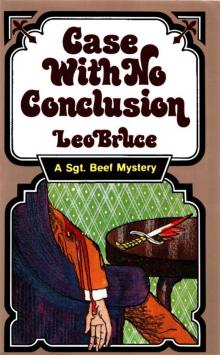 Case with No Conclusion
Case with No Conclusion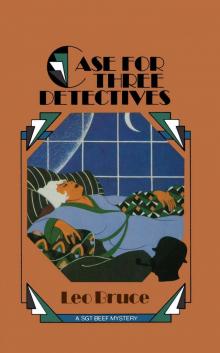 Case for Three Detectives
Case for Three Detectives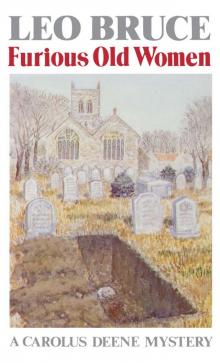 Furious Old Women
Furious Old Women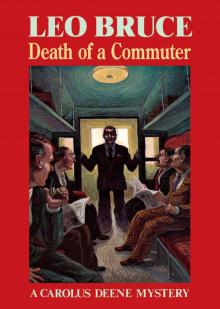 Death of a Commuter
Death of a Commuter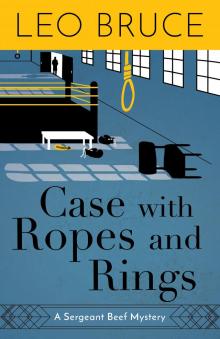 Case with Ropes and Rings
Case with Ropes and Rings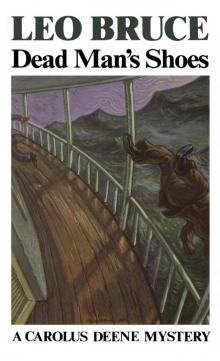 Dead Man’s Shoes
Dead Man’s Shoes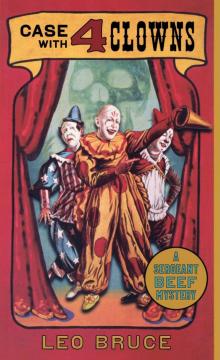 Case with 4 Clowns
Case with 4 Clowns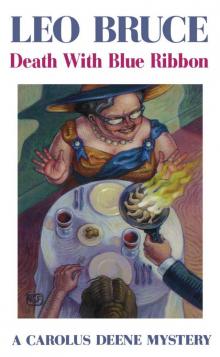 Death with Blue Ribbon
Death with Blue Ribbon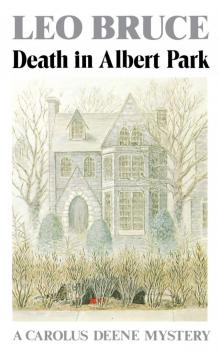 Death in Albert Park
Death in Albert Park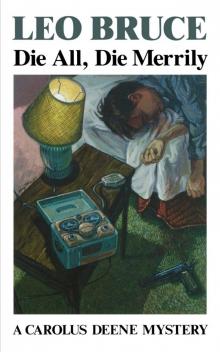 Die All, Die Merrily
Die All, Die Merrily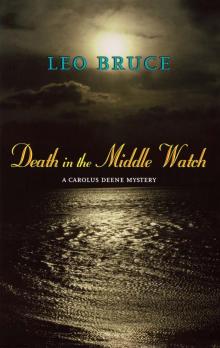 Death in the Middle Watch
Death in the Middle Watch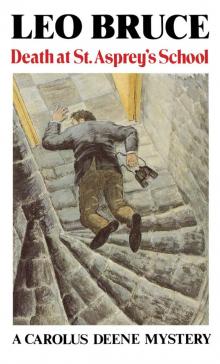 Death at St. Asprey’s School
Death at St. Asprey’s School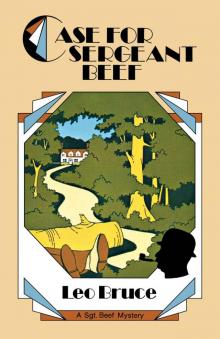 Case for Sergeant Beef
Case for Sergeant Beef